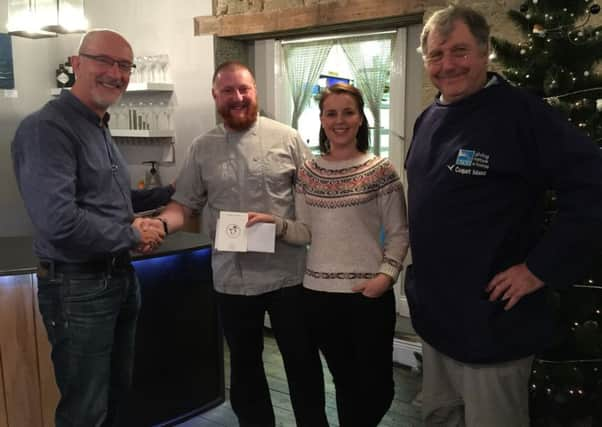Popcorn for puffins


A cheque for £45 was handed over from Sea and Soil Bistro (formerly SeaSalt), a family-run business in Amble, to support the charity’s work on Coquet Island safeguarding the iconic puffin colony.
The cheque was handed over by the bistro’s owners, the appropriately-named Jonny Bird and his wife Julie, to Dr Paul Morrison and Dr Keith Clarkson, having raised the money from a stall selling popcorn and mulled cider.
Advertisement
Hide AdAdvertisement
Hide AdPaul said: “I am delighted to receive this gift from Sea and Soil and the money will go straight to the budget to be spent on Coquet.”
Last year, Sea and Soil donated a brand-new Tilley lamp for Coquet – those with long memories will remember paraffin lamps being commonplace in homes, but on Coquet, with no mains electricity, they are still used to provide light and warmth.
Paul added: “Coquet is a special place for seabirds and I know it is treasured by the people of Amble so my thanks go to Sea and Soil and to those who supported this initiative.”
Coquet Island is home to the largest puffin colony on a RSPB reserve nationally, but the dramatic news broke at the end of last year that puffins are in serious decline elsewhere in Europe and have been added to the red list of endangered species.
Advertisement
Hide AdAdvertisement
Hide AdWork to protect and monitor these birds on Coquet starts each March when the puffins return to breed having spent the winter on the water in the North Sea and Atlantic Ocean.
Climatic changes has resulted in vegetation changes on Coquet with the loss of the natural maritime turf and the spread of Yorkshire fog, a tall-growing grass that threatens to engulf the island and swamp the burrow entrances. An enormous amount of time is spent strimming and raking this rank vegetation along with encouraging a small population of geese which enjoy munching Yorkshire fog.
Counting the puffins takes place every five years to monitor and track how well the Coquet puffin numbers are doing and a small number are ringed to offer insight into where they travel.
Although puffins nest underground, some have chosen to nest in boxes, intended for roseate terns. In case this habit spreads, the wardens put out double the number of boxes so that roseates terns and puffins have enough boxes to go round.